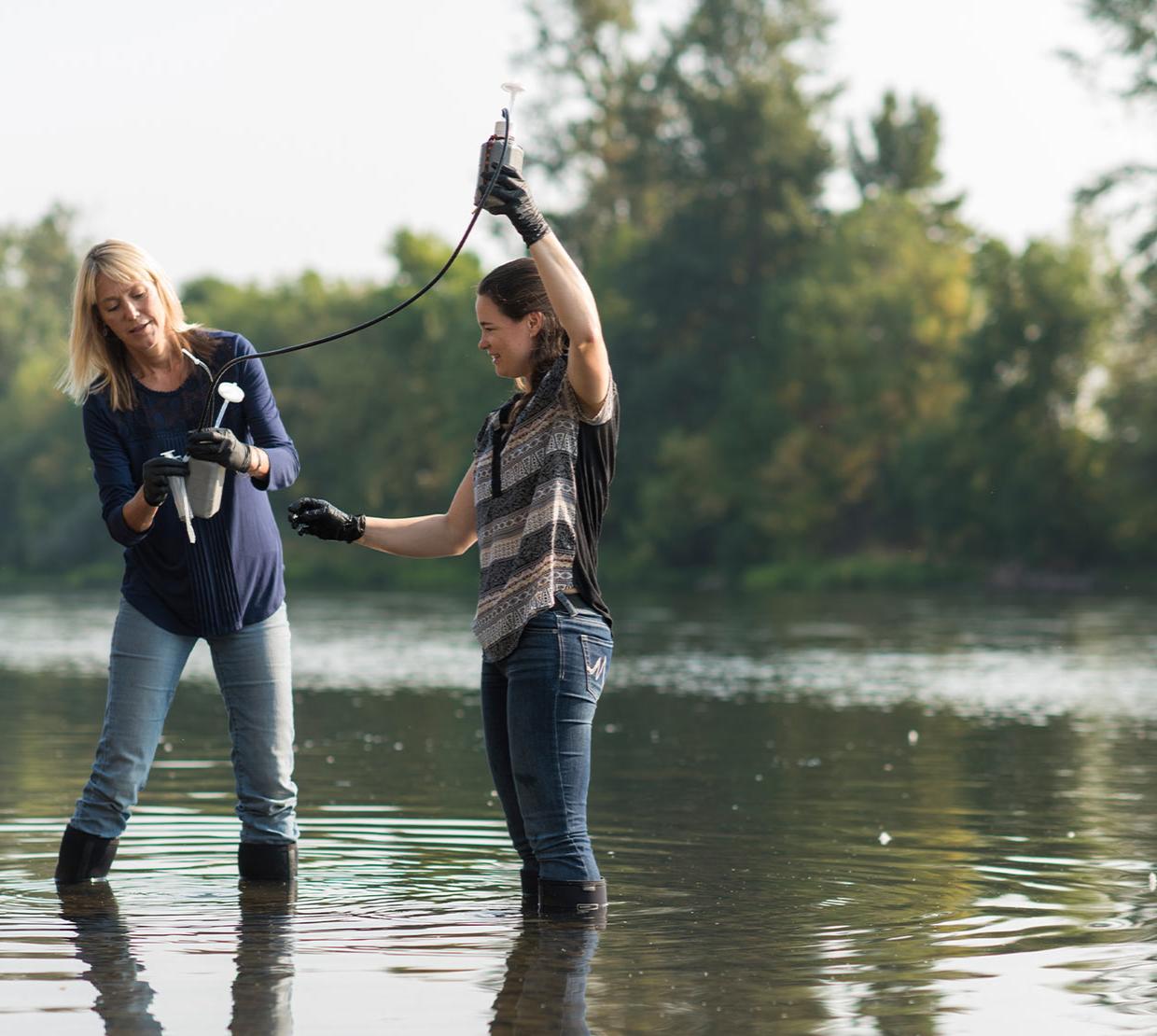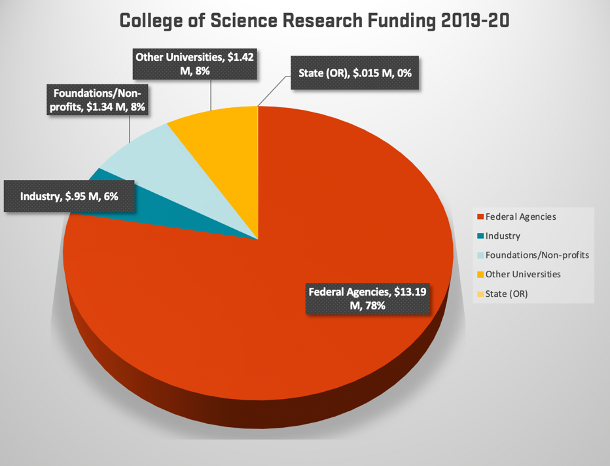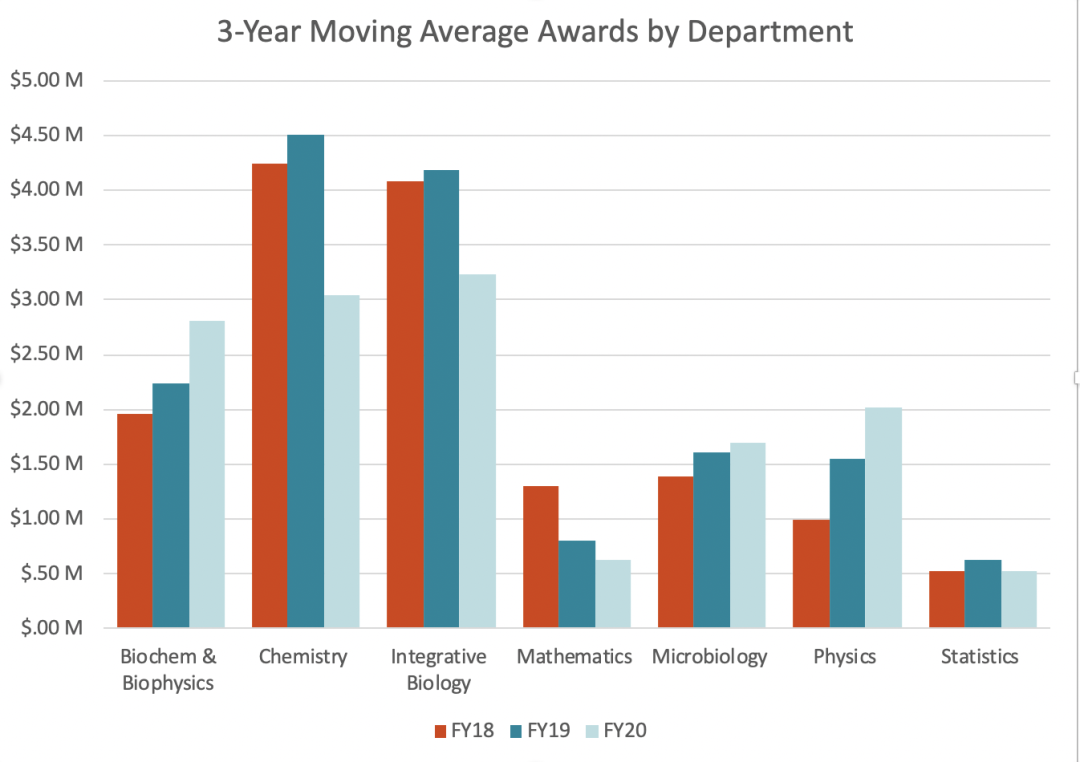College of Science research expenditures for FY20 totaled $11.72M – up 5% from $11.05M the previous year. Federally funded expenditures for the year were $8.78M.
Many science faculty received substantial research grants this year. Below are just a few notable awards that demonstrate the College’s breadth of research in the life, physical, mathematical and computational sciences.
Ecologist Benjamin Dalziel received a $800K grant from PacificSource Health Plans and a $750K grant from the David and Lucile Packard Foundation for the project entitled “Team-based Rapid Assessment of Community-level coronavirus Epidemics” or TRACE-COVID-19. This groundbreaking project is gathering timely information to inform measures to slow the spread of the virus SARS-CoV-2, and minimize the impact of the disease. Using a community-based approach, the study rapidly assesses the prevalence of the coronavirus in Corvallis, Bend, Newport and Hermiston – with the goal of expanding to other Oregon communities and across the nation.
Coral microbiologist Rebecca Vega Thurber received a 3-year, $627K NSF grant for her project "Tracking the interacting roles of the environment, host genotype, and a novel Rickettsiales in coral disease." Her project aims to uncover the holistic mechanisms of disease susceptibility in the critically endangered staghorn coral, Acropora cervicornis, to help practitioners work more effectively toward conservation and restoration.
Chemist Claudia Maier received a one-year, equipment grant for $577K from the National Institutes for Health for her project “Ultra Performance Liquid Chromatograph Tandem Quadrupole Mass Spectrometry System.”
Biochemist Colin Johnson received $336K from the National Institutes of Health — Institute on Deafness for his project "In vivo and in vitro studies of the deafness associated protein otoferlin."
Chemist Wei Kong received $332K from the NIH's Institute of General Medical Sciences for her project, "Serial Single Molecule Electron Diffraction Imaging: Atomic Structures of Biological Macromolecules without Crystals."
Biochemist Viviana Perez received a two-year, $400K grant from the National Institutes of Health for her project, "Nrf2 deficiency as a prime modulator of cellular senescence and Alzheimer's disease."
Physicist Yun-Shik Lee received a $380K award from the National Science Foundation (NSF) for his project "High-Field Terahertz Driven Photocarrier Dynamics in Nanomaterials."
Biologist Jadwiga Giebultowicz received a one-year $378K NIH grant for her project "Links Between Age-related Changes in Energy Metabolism and Alzheimer's Disease."
Microbiologists Kimberly Halsey and Stephen Giovannoni received a $685K grant from the National Science Foundation for their project entitled "Interactions between phytoplankton and bacterioplankton mediated by volatile organic compounds.”
Chemist May Nyman received a three-year, $540K grant from the U.S. Department of Energy for her project, "Hydrolysis, self-assembly and supramolecular assembly of early transition metal-oxo clusters: MOF nodes and aqueous reaction pathways."
Biochemist Colin Johnson received $494K from the National Science Foundation for a three-year project entitled “Establishing a common function for ferlin proteins in membrane fusion using novel genetic code expansion and single molecule techniques.”
Chemist Rich Carter received a $438K grant from the National Science Foundation to study adding innovation and entrepreneurial achievements into the criteria for higher education faculty promotion and tenure.
Graduate student Lillian Padgitt-Cobb, who works with biochemist David Hendrix, won a $120K USDA-NIFA Predoctoral Fellowship for her project “Chromosome-level assembly and genomic data science to reveal insights about cone development, disease resistance, and the evolutionary history of hop (Humulus lupulus).”
Graduate student Michelle Tran, who works with chemist Vincent Remcho, received a $80K NASA Predoctoral Fellowship for her project “Rapid and Minimally Invasive Glass Microfiber-based Biodosimeter for an In-flight Quantification of Radiation from Finger Prick Blood Samples.”
Looking ahead: Positive momentum for FY21
Two months into the new fiscal year, the College is seeing strong momentum with significant awards totaling more than $3.48M already. Below are just a few incoming awards received since July 1, 2020:
Biochemist Elisar Barbar received a two-year $300K EAGER grant from the National Science Foundation to pursue research on SARS-CoV-2 coronavirus that causes Covid-19. The research project is aimed at understanding how the N-protein of the SARS-CoV-2 performs its essential functions in viral infection and transmission. Associate professor David Hendrix and Rick Cooley, a research assistant professor in the Department of Biochemistry and Biophysics, are collaborators on the project.
Ecologist Benjamin Dalziel received $400K from the David and Lucille Packard Foundation for the TRACE-COVID-19 Expansion project.
Mathematicians Vrushali Bokil and Nathan Gibson were awarded $225K from NSF's computational mathematics program for their project "Computational and Multi-Scale Methods for Nonlinear Electromagnetic models in Plasmas and Nanocomposites."
Microbiologist Rebecca Vega Thurber received a four-year $800K grant from the National Science Foundation for a project entitled “Collaborative Research: Tipping points in coral reefs and their associated microbiomes: interactive effects of herbivory, nutrient enrichment, and temperature.”
Mathematician Mary Beisiegel received funding from the National Science Foundation for three projects:
- $208K for her project entitled “Development Focused on Engaged Learning, Inclusive Teaching, and Equity (ELITE PD)”
- $2.1M for her project, with OSU's portion $855K over five years, entitled “Collaborative Research: Mathematics Graduate Teaching Assistant Professional Development Focused on Implementation of Evidence-based Teaching Practices”
- $124K for a three-year project entitled “Collaborative Research: Algebra Instruction at Community Colleges: Validating Measures of Quality Instruction (AI@CC 2.0)”
Physicist Bo Sun received $528K from the Department of Defense for a project entitled “Decoding the mechano-regulation of breast tumor organoid invasion – one cell at a time.”
Biologist Kirsten Grorud-Colvert received two funding grants:
- $203K from the Rockefeller Philanthropy Advisors for an existing project entitled “The MPA Project: Clarity and transparency to enable true ocean protection.”
- $27K from the Resources Legacy Fund for her project entitled “Scientific synthesis to inform a bold, ambitious vision for effective protected areas in the U.S. ocean.”
Chemist Chong Fang received $390K from the National Science Foundation for his project entitled, “Spectroscopy-guided Design of Biomimetic Fluorescent Probes.”
Physicist Weihong Qiu was awarded a $316K grant from the National Institutes of Health for his project entitled “Mechanistic Analysis of Kinesin-14 Motility and Regulation for Bipolar Spindle Assembly.”






